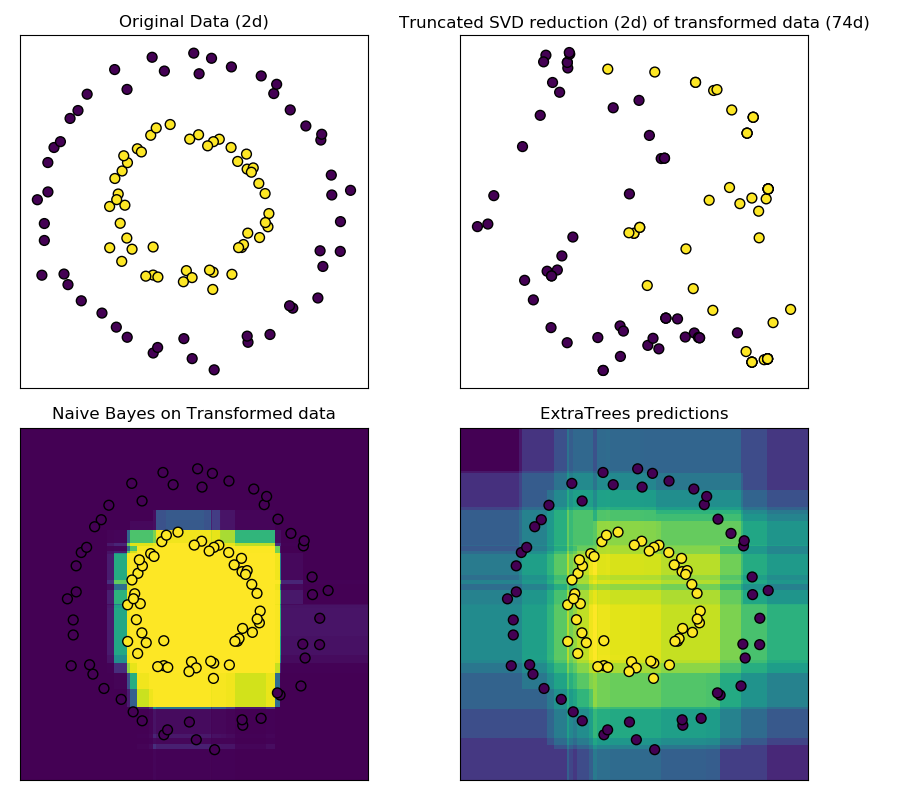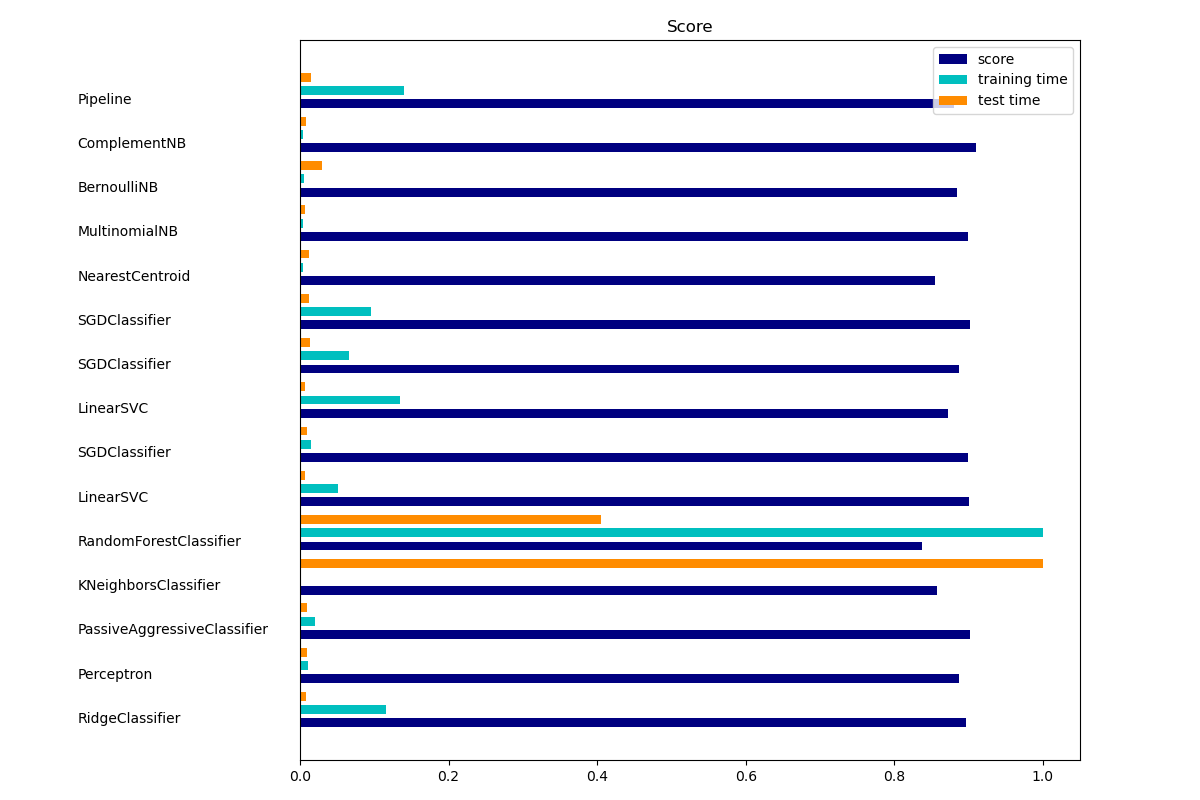sklearn.naive_bayes.BernoulliNB¶
class sklearn.naive_bayes.BernoulliNB(*, alpha=1.0, binarize=0.0, fit_prior=True, class_prior=None)
[源码]
用于多元伯努利模型的朴素贝叶斯分类器。
像MultinomialNB一样,这个分类器也适用于离散数据。区别在于,MultinomialNB可处理多分类,但BernoulliNB是为二分类或布尔型函数而设计的。
在用户指南中阅读更多内容。
| 参数 | 说明 |
|---|---|
| alpha | float, default=1.0 附加的平滑参数(Laplace/Lidstone),0是不平滑 |
| binarize | float or None, default=0.0 用于将样本特征二值化(映射为布尔值)的阈值。如果为None,则假定输入已经由二分类向量组成。 |
| fit_prior | bool, default=True 是否学习类别先验概率。如果为False,将使用统一的先验。 |
| class_prior | array-like of shape (n_classes,), default=None 类别的先验概率。一经指定先验概率不能随着数据而调整。 |
| 属性 | 说明 |
|---|---|
| class_count_ | ndarray of shape (n_classes) 拟合期间每个类别遇到的样本数。此值由提供的样本权重加权。 |
| class_log_prior_ | ndarray of shape (n_classes) 每个类别的对数概率(平滑)。 |
| classes_ | ndarray of shape (n_classes,) 分类器已知的类别标签 |
| feature_count_ | ndarray of shape (n_classes, n_features) 拟合期间每个(类别,特征)遇到的样本数。此值由提供的样品权重加权。 |
| feature_log_prob_ | ndarray of shape (n_classes, n_features) 给定一类P(x_i / y)的特征的经验对数概率。 |
| n_features_ | int 每个样本的特征数量。 |
参考文献
C.D. Manning, P. Raghavan and H. Schuetze (2008). Introduction to Information Retrieval. Cambridge University Press, pp. 234-265. https://nlp.stanford.edu/IR-book/html/htmledition/the-bernoulli-model-1.html
A. McCallum and K. Nigam (1998). A comparison of event models for naive Bayes text classification. Proc. AAAI/ICML-98 Workshop on Learning for Text Categorization, pp. 41-48.
V. Metsis, I. Androutsopoulos and G. Paliouras (2006). Spam filtering with naive Bayes – Which naive Bayes? 3rd Conf. on Email and Anti-Spam (CEAS).
示例
>>> import numpy as np
>>> rng = np.random.RandomState(1)
>>> X = rng.randint(5, size=(6, 100))
>>> Y = np.array([1, 2, 3, 4, 4, 5])
>>> from sklearn.naive_bayes import BernoulliNB
>>> clf = BernoulliNB()
>>> clf.fit(X, Y)
BernoulliNB()
>>> print(clf.predict(X[2:3]))
[3]
方法
| 方法 | 说明 |
|---|---|
fit(X, y[, sample_weight]) |
根据X,y拟合朴素贝叶斯分类器 |
get_params([deep]) |
获取这个估计器的参数 |
partial_fit(X, y[, classes, sample_weight]) |
对一批样本进行增量拟合 |
predict(X) |
对测试向量X进行分类。 |
predict_log_proba(X) |
返回针对测试向量X的对数概率估计 |
predict_proba(X) |
返回针对测试向量X的概率估计 |
score(X, y[, sample_weight]) |
返回给定测试数据和标签上的平均准确率。 |
set_params(**params) |
为这个估计器设置参数 |
__init__(*, alpha=1.0, binarize=0.0, fit_prior=True, class_prior=None)
[源码]
初始化self。详情可参阅 type(self)的帮助。
fit(X, y, sample_weight=None)
[源码]
根据X,y拟合朴素贝叶斯分类器
| 参数 | 说明 |
|---|---|
| X | {array-like, sparse matrix} of shape (n_samples, n_features) 用于训练的向量,其中n_samples是样本数量,n_features是特征数量。 |
| y | array-like of shape (n_samples,) 目标值。 |
| sample_weight | array-like of shape (n_samples,), default=None 应用于单个样本的权重(1.未加权)。 |
| 返回值 | 说明 |
|---|---|
| self | object |
get_params(deep=True)
[源码]
获取这个估计器的参数
| 参数 | 说明 |
|---|---|
| deep | bool, default=True 如果为True,则将返回这个估计器的参数和所包含的估算器子对象。 |
| 返回值 | 说明 |
|---|---|
| params | mapping of string to any 参数名称映射到其值。 |
partial_fit(X, y, classes=None, sample_weight=None)
[源码]
对一批样本进行增量拟合.
| 参数 | 说明 |
|---|---|
| X | {array-like, sparse matrix} of shape (n_samples, n_features) 用于训练的向量,其中n_samples是样本数量,n_features是特征数量。 |
| y | array-like of shape (n_samples,) 目标值。 |
| classes | array-like of shape (n_classes), default=None y向量中可能出现的所有类别的列表。 必须在第一次调用partial_fit时提供,在随后的调用中可以省略。 |
| sample_weight | array-like of shape (n_samples,), default=None 应用于单个样本的权重(1.未加权)。 |
| 返回值 | 说明 |
|---|---|
| self | object |
predict(X)
[源码]
对测试向量X进行分类。
| 参数 | 说明 |
|---|---|
| X | array-like of shape (n_samples, n_features) |
| 返回值 | 说明 |
|---|---|
| C | ndarray of shape (n_samples,) X的预测目标值 |
predict_log_proba(X)
[源码]
返回针对测试向量X的对数概率估计
| 参数 | 说明 |
|---|---|
| X | array-like of shape (n_samples, n_features) |
| 返回值 | 说明 |
|---|---|
| C | array-like of shape (n_samples, n_classes) 返回模型中每个类别的样本的对数概率。这些列按照排序顺序对应于类,就像它们出现在属性classes_中一样。 |
predict_proba(X)
[源码]
返回针对测试向量X的概率估计
| 参数 | 说明 |
|---|---|
| X | array-like of shape (n_samples, n_features) |
| 返回值 | 说明 |
|---|---|
| C | array-like of shape (n_samples, n_classes) 返回模型中每个类别的样本概率。这些列按照排序顺序对应于类,就像它们出现在属性classes_中一样。 |
score(X, y, sample_weight=None)
[源码]
返回给定测试数据和标签上的平均准确率。
在多标签分类中,这是子集准确性,这是一个严格的指标,因为您需要为每个样本正确预测每个标签集。
| 参数 | 说明 |
|---|---|
| X | array-like of shape (n_samples, n_features) 测试样本 |
| y | array-like of shape (n_samples,) or (n_samples, n_outputs) X的真实标签 |
| sample_weight | array-like of shape (n_samples,), default=None 样本权重 |
| 返回值 | 说明 |
|---|---|
| score | float self.predict(X) 关于y的平均准确率。 |
set_params(**params)
[源码]
为这个估计器设置参数。
| 参数 | 说明 |
|---|---|
| **params | dict 估计器参数。 |
| 返回值 | 说明 |
|---|---|
| self | object 估计器实例。 |






